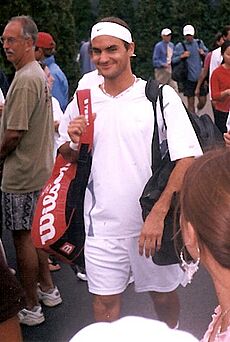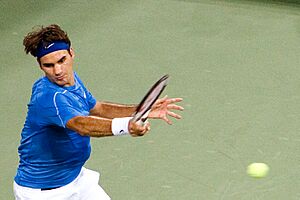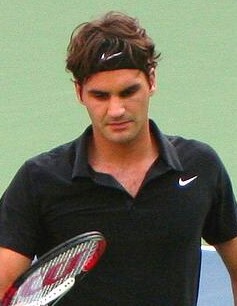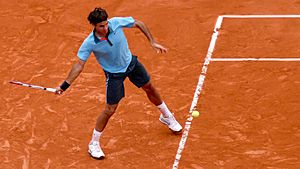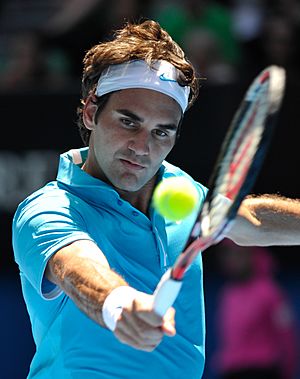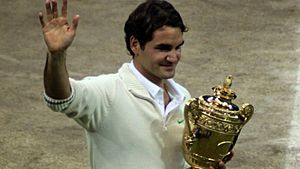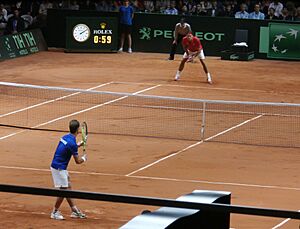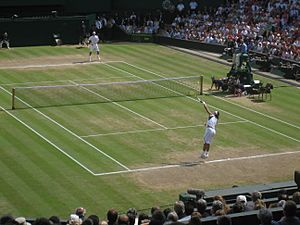Roger Federer facts for kids
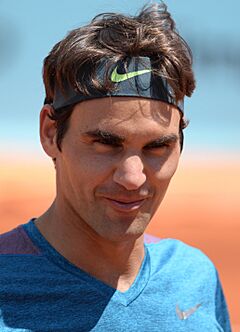
Federer at the 2015 Mutua Madrid Open
|
||||||||||||||
| Country (sports) | ||||||||||||||
|---|---|---|---|---|---|---|---|---|---|---|---|---|---|---|
| Residence | Valbella, Switzerland | |||||||||||||
| Born | 8 August 1981 Basel, Switzerland |
|||||||||||||
| Height | 1.85 m (6 ft 1 in) | |||||||||||||
| Turned pro | 1998 | |||||||||||||
| Retired | 23 September 2022 | |||||||||||||
| Plays | Right-handed (one-handed backhand) | |||||||||||||
| Prize money | US$130,594,339
|
|||||||||||||
| Singles | ||||||||||||||
| Career record | 1251–275 (82.0%) | |||||||||||||
| Career titles | 103 (2nd in the Open Era) | |||||||||||||
| Highest ranking | No. 1 (2 February 2004) | |||||||||||||
| Grand Slam singles results | ||||||||||||||
| Australian Open | W (2004, 2006, 2007, 2010, 2017, 2018) | |||||||||||||
| French Open | W (2009) | |||||||||||||
| Wimbledon | W (2003, 2004, 2005, 2006, 2007, 2009, 2012, 2017) | |||||||||||||
| US Open | W (2004, 2005, 2006, 2007, 2008) | |||||||||||||
| Other tournaments | ||||||||||||||
| Tour Finals | W (2003, 2004, 2006, 2007, 2010, 2011) | |||||||||||||
| Olympic Games | F (2012) | |||||||||||||
| Doubles | ||||||||||||||
| Career record | 131–93 (58.5%) | |||||||||||||
| Career titles | 8 | |||||||||||||
| Highest ranking | No. 24 (9 June 2003) | |||||||||||||
| Grand Slam doubles results | ||||||||||||||
| Australian Open | 3R (2003) | |||||||||||||
| French Open | 1R (2000) | |||||||||||||
| Wimbledon | QF (2000) | |||||||||||||
| US Open | 3R (2002) | |||||||||||||
| Other doubles tournaments | ||||||||||||||
| Olympic Games | W (2008) | |||||||||||||
| Team competitions | ||||||||||||||
| Davis Cup | W (2014) | |||||||||||||
| Hopman Cup | W (2001, 2018, 2019) | |||||||||||||
| Signature | ||||||||||||||
 |
||||||||||||||
|
Medal record
|
||||||||||||||
Roger Federer, born on August 8, 1981, is a famous Swiss former professional tennis player. Many people consider him one of the greatest tennis players of all time. He was ranked as the world's number one player by the Association of Tennis Professionals (ATP) for a total of 310 weeks. This included an amazing record of 237 weeks in a row. He also finished five years as the top-ranked player.
Federer won 103 singles titles on the ATP Tour, which is the second-highest number in the Open Era (since 1968). His wins include 20 major men's singles titles, like a record eight Wimbledon titles. He also won five US Open titles, which is a shared record in the Open Era. He also won six year-end championships, called the ATP Finals.
For almost 20 years, Roger Federer was one of the most important players in men's tennis. He played alongside Rafael Nadal and Novak Djokovic, and together they were known as the Big Three. Federer was a junior champion at Wimbledon in 1998. He won his first major singles title at Wimbledon in 2003 when he was 21.
After that, Federer was the top player in men's tennis for several years. Between 2004 and 2009, he played in 20 out of 24 major singles finals. He won three of the four major tournaments and the Tour Finals in 2004, 2006, and 2007. He also won five titles in a row at both Wimbledon and the US Open. Federer achieved a career Grand Slam at the 2009 French Open. This meant he had won all four major tournaments at least once in his career. He achieved this after finishing second to Nadal three times in a row. At 27, he broke Pete Sampras's record of 14 major men's singles titles at Wimbledon in 2009.
Federer and Stan Wawrinka helped the Switzerland Davis Cup team win their first Davis Cup title in 2014. They had also won an Olympic doubles gold medal at the 2008 Beijing Olympics. Federer also won a silver medal in singles at the 2012 London Olympics, finishing second to Andy Murray. After taking a break in 2016 for knee surgery, Federer came back strong. He won three more major titles over the next two years. These included the 2017 Australian Open against Nadal and a record eighth singles title at the 2017 Wimbledon Championships. At the 2018 Australian Open, Federer became the first man to win 20 major singles titles. Soon after, at 36, he became the oldest ATP world No. 1 player at that time. He retired from professional tennis in September 2022 after the Laver Cup.
Federer was known for his graceful playing style, which made him very popular. Even though he struggled with self-control as a junior, he changed his behavior on the court. He became known for being kind and fair, winning the Stefan Edberg Sportsmanship Award 13 times. He also won the Laureus World Sportsman of the Year award five times. Outside of tennis, Federer helped create the Laver Cup team competition. He is also very active in charity work. He started the Roger Federer Foundation, which helps children in need in southern Africa. He raised money through special exhibition matches called Match for Africa. By the end of his career, Federer was one of the highest-paid athletes in the world.
Contents
- Early Life and Tennis Beginnings
- Roger's Tennis Journey
- Junior Years: 1995–1998
- Early Professional Career: 1998–2002
- Grand Slam Success: 2003–2009
- Later Career: 2010s
- 2010: Fourth Australian Open
- 2011: ATP Finals Record
- 2012: Wimbledon Title and Return to No. 1
- 2013: Injuries and Ranking Drop
- 2014: Davis Cup Victory
- 2015: 1,000th Win and Major Finals
- 2016: Knee Surgery and Long Break
- 2017: Amazing Comeback Season
- 2018: 20th Major Title and Oldest No. 1
- 2019: 100th Title and Wimbledon Final
- Final Years: 2020–2022
- Rivalries and Competition
- Roger Federer's Legacy
- Player Profile
- Off the Court Life
- Personal Life
- Career Statistics
- Records
- See also
Early Life and Tennis Beginnings
Roger Federer was born in Basel, Switzerland, on August 8, 1981. His father, Robert Federer, is Swiss, and his mother, Lynette Federer, is from South Africa. Because his mother is South African, Roger has citizenship in both Switzerland and South Africa. He also has an older sister named Diana.
When Roger was young, he and his sister would go with their parents to private tennis courts on weekends. His parents worked for a company called Ciba-Geigy Pharmaceuticals. Roger first started playing tennis there when he was three years old.
Becoming a Young Tennis Star
Roger quickly became the best player in his age group at school. When he was eight, his mother enrolled him in a special junior program at the Old Boys Tennis Club in Basel. There, he learned tennis from a coach named Adolf Kacovsky. Roger started using a one-handed backhand early on. This was because his coach liked it, and his childhood heroes like Stefan Edberg and Pete Sampras also used it.
From ages 8 to 10, Roger had group and individual lessons with Kacovsky. At age 10, an Australian coach named Peter Carter started teaching him. Federer has said that Carter taught him his "entire technique and coolness."
Playing Many Sports
Roger grew up playing many different sports. These included badminton, basketball, football, and tennis. He loved tennis and football the most. He also tried skiing and swimming and spent hours playing soft tennis in the street. He believes that playing many sports helped him develop great hand-eye coordination.
In 1993, Roger won the under-12 Swiss national junior championships. Becoming the best junior player in Switzerland helped him decide to become a professional tennis player. So, at age twelve, he stopped playing football to focus only on tennis. He felt he had more control over his wins or losses in tennis, unlike team sports where he depended on his teammates. Roger was also a ball boy at the Swiss Indoors tournament in his hometown of Basel in 1992 and 1993. He even received a medal from the tournament champion, Michael Stich, in 1993.
Training at the National Center
Between 1995 and 1997, Roger trained at the Swiss National Tennis Center in Ecublens. Here, he learned to speak French when he was 14. He finished his school education in July 1997.
Roger's Tennis Journey
Junior Years: 1995–1998
In 1995, at 13, Roger won the U14 Swiss national junior championship. He was then invited to train at the National Tennis Centre in Ecublens. There, he could train for three hours a day and also study. However, Roger was not very interested in studying and found it hard to balance school with tennis. He spoke little French and missed home, so his first months at Ecublens were tough. He was the youngest player and felt picked on by some students and staff. He often wanted to go home. Roger says this difficult time helped him become more independent.
Roger played his first junior match in July 1996 when he was 14. In January 1997, at 15, he won both the indoor and outdoor U18 Swiss national championships. He won his first junior title in May without losing a set. In September, Roger earned his first ATP points, starting his professional ranking at No. 803.
His biggest junior achievements came at Wimbledon in 1998. He won both the Boys' singles and Boys' doubles titles. He then reached the US Open Junior final, which he lost. This was his only loss in a junior final. He ended his junior career by winning the Junior Orange Bowl in Miami. By the end of 1998, he was the No. 1 junior player in the world.
Early Professional Career: 1998–2002
In July 1998, almost 17-year-old Roger played his first ATP match in Switzerland. He lost in the first round. Later that year, he won his first ATP match in Toulouse. He finished 1998 ranked 301st in the world.
In April 1999, Roger played his first Davis Cup match. In August, he won his first professional title on the Challenger tour. He entered the world's Top 100 for the first time in September 1999. By the end of 1999, he was the youngest player in the year-end Top 100.
His first Grand Slam win was at the Australian Open in 2000. He reached his first singles final in February 2000 but lost. He ended 2000 ranked 29th. Roger made his Olympic debut in Sydney but lost in the semifinals. In January 2001, he won the Hopman Cup for Switzerland with Martina Hingis.
In 2001, Roger won his first singles title. He reached his first Grand Slam quarterfinal at the French Open. His big breakthrough came at the Wimbledon Championships. The 19-year-old Federer beat the four-time defending champion, Pete Sampras, in a five-set match. This ended Sampras's 31-match winning streak at Wimbledon.
In 2002, Roger reached his first Masters final. He then won his first Masters title in Hamburg, which put him in the top 10 for the first time. On August 1, Roger's long-time coach and mentor, Peter Carter, died in a car crash. This deeply affected Roger. He played with more determination after this. He ended 2002 ranked No. 6 in the world.
Grand Slam Success: 2003–2009
2003: Wimbledon Breakthrough
In 2003, Roger won his first Grand Slam singles title at Wimbledon. He beat Andy Roddick in the semifinals and Mark Philippoussis in the final. This made him one of the few players to win both the junior and senior Wimbledon titles. He won seven titles on four different surfaces that year. He also won the year-end championships and finished the year as world No. 2.
2004: Becoming World No. 1
In 2004, Roger won three Grand Slam singles titles. He was the first person to do this in a single season since 1988. He won the Australian Open, becoming world No. 1 for the first time. He then won his second Wimbledon title. At the US Open, he won his first title there. He finished the year by winning the year-end championships again. His 11 singles titles were the most in two decades.
2005: Staying on Top
In 2005, Roger reached the semifinals of the first two Grand Slams. He won Wimbledon for the third time. At the US Open, he beat Andre Agassi in Agassi's last major final. Roger also won four Masters titles. He won 11 singles titles that year and remained No. 1 for the entire season.
2006: Best Season Ever
The 2006 season was Roger's best. He won 12 singles titles, the most since 1984. He reached the finals in 16 of the 17 tournaments he played.
In 2006, Roger won three Grand Slam singles titles and reached the final of the fourth. His only loss was to Nadal at the French Open. He was the first man since 1969 to reach all four major finals in a year. He beat Nadal in the Wimbledon final. He won the Australian Open and the US Open. He finished the year as world No. 1 again.
2007: Battling New Rivals
In 2007, Roger reached all four Grand Slam singles finals again, winning three of them. At the Australian Open, he won without losing a set. He extended his winning streak to 41 matches, his longest ever. This streak ended when he lost to Guillermo Cañas.
During the clay season, Roger ended Nadal's 81-match winning streak on clay. This happened in the final of the Hamburg Masters. At Wimbledon, Roger beat Nadal again in a thrilling five-set final. This win tied him with Björn Borg for five consecutive Wimbledon championships. He won the US Open for the fourth time. He finished the season as the year-end No. 1 for the fourth year in a row.
2008: Olympic Gold and US Open Win
Roger's success in 2008 was affected by mononucleosis, an illness that made him very tired. At the Australian Open, he lost in the semifinals, ending his record of 10 consecutive major finals. He lost to Nadal in two clay Masters finals.
At the Olympic Games, Roger and Stan Wawrinka won the gold medal in doubles. However, Roger lost in the singles quarterfinals, which meant he lost his No. 1 ranking to Nadal after a record 237 weeks. Roger won his only Grand Slam of 2008 at the US Open, beating Andy Murray in the final. He ended the year ranked No. 2.
2009: Career Grand Slam and Record Titles
Roger started 2009 by losing to Nadal in a close five-set final at the Australian Open. He struggled for a while after this.
His season changed when he beat Nadal on clay for only the second time to win the Madrid Masters. After Nadal's unexpected loss, Roger became the favorite to win the French Open. He came back from two sets down in one match and won a tough five-setter in the semifinals. In the final, he won in straight sets, completing his career Grand Slam. This win also tied him with Pete Sampras for 14 major singles titles.
At Wimbledon, Roger faced Andy Roddick in a historic final. It was the longest Grand Slam final in terms of games played. Roger won 16–14 in the fifth set, winning his 15th major title and breaking Sampras's record. He won the Cincinnati Masters again. At the US Open, he lost in the final. Roger finished 2009 as the year-end No. 1 for the fifth time.
Later Career: 2010s
2010: Fourth Australian Open
Roger started 2010 by winning the Australian Open, beating Andy Murray in the final. This extended his major singles record to 16 titles. He had reached 18 out of 19 major finals since 2005 Wimbledon, showing incredible consistency. However, this tournament marked the end of his complete dominance at the majors.
At the French Open, he lost in the quarterfinals, ending his streak of reaching Grand Slam semifinals. He also lost his No. 1 ranking. At Wimbledon, he lost in the quarterfinals again and fell to No. 3 in the rankings.
Roger hired Pete Sampras's old coach, Paul Annacone, in July. He reached the semifinals at the US Open, losing to Novak Djokovic after holding two match points. Roger finished the year strong, winning titles in Stockholm, Basel, and the ATP Finals in London. He beat Djokovic and Nadal in the finals of the last two.
2011: ATP Finals Record
The year 2011 was not as successful for Roger in majors. He lost to Djokovic in the semifinals of the Australian Open. At the French Open semifinals, he ended Djokovic's 43-match winning streak but then lost to Rafael Nadal in the final. At Wimbledon, he lost in the quarterfinals after winning the first two sets, which was a first for him.
At the US Open, he lost to Novak Djokovic in the semifinals after winning the first two sets again. This meant he had not won any Grand Slam titles in 2011, which had not happened since 2002. Roger finished the season well, winning his last three tournaments of the year. He ended 2011 ranked No. 3.
2012: Wimbledon Title and Return to No. 1
Roger started 2012 by reaching the Australian Open semifinal, where he lost to Nadal. He then won titles in Rotterdam, Dubai, and Indian Wells.
He won the Madrid Masters on the new blue clay surface, regaining the No. 2 ranking. At the French Open, he lost to Djokovic in the semifinals.
At Wimbledon, Roger won his seventh Wimbledon championship, tying Sampras's record. With this win, he returned to the top spot in the world rankings. He broke Sampras's record of 286 weeks at No. 1. At the 2012 Summer Olympics, Roger won a silver medal after losing to Murray in the final.
In August, Roger won the Cincinnati Masters. At the Shanghai Masters, he reached his 300th week at No. 1, a major milestone. He ended the season by reaching the final of the ATP Finals.
2013: Injuries and Ranking Drop
Roger had back injuries in 2013, and his ranking dropped from No. 2 to No. 6. His only title of 2013 was at the Gerry Weber Open. At Wimbledon, he suffered his worst Grand Slam defeat since 2003, losing in the second round. This ended his record streak of 36 consecutive quarterfinals at Grand Slams. He also dropped out of the top 4 for the first time since 2003.
He continued to struggle with his back injury. In December 2013, Roger announced that Stefan Edberg was joining his coaching team.
2014: Davis Cup Victory
At the Australian Open, Roger reached his 11th straight semifinal in Melbourne. He lost to Rafael Nadal. He won his sixth Dubai title. Roger and Stanislas Wawrinka helped the Swiss team reach the Davis Cup final for the first time since 1992.
At the Halle Open, Roger won the singles title. At Wimbledon, he reached a record ninth final but lost to Djokovic in a five-set match.
He won his sixth Cincinnati title. At the US Open, he lost in the semifinals. At the Shanghai Masters, Roger beat Djokovic in the semifinals and won the title. This brought him back to the No. 2 ranking. He won the Swiss Indoors for a record sixth time. Roger had to withdraw from the 2014 ATP Finals due to a back injury.
Despite his injury, Roger helped Switzerland win the Davis Cup for the first time in its history.
2015: 1,000th Win and Major Finals
Roger started 2015 by winning the Brisbane International. This made him only the third man in the Open Era to have 1,000 or more wins. He also became the first man to win at least one title in 15 consecutive years. He successfully defended his title at the Dubai Championships.
In May, Roger won his first clay-court title since 2009. He reached the Italian Open final but lost. At the French Open, he lost in the quarterfinals. He won his record eighth Gerry Weber Open title. At Wimbledon, he reached his tenth final but lost to Djokovic.
Roger won the Cincinnati Masters for the seventh time, beating Murray and Djokovic. At the US Open, he reached the final without losing a set but was again beaten by Djokovic. He then won the Swiss Indoors.
In December, Roger announced that Ivan Ljubičić would join his coaching team.
2016: Knee Surgery and Long Break
Roger started 2016 by losing in the final of the Brisbane International. At the Australian Open, he lost in the semifinals to Novak Djokovic. The day after, Roger injured his knee and had surgery in February. He missed several tournaments. He also had to withdraw from the Miami Open due to a stomach virus.
Roger returned at the Monte-Carlo Masters. His withdrawal from the French Open broke his record of 65 straight Grand Slam appearances. He continued to have knee pain during the grass season. At Wimbledon, he reached the semifinals but re-injured his knee.
On July 26, Roger announced he would miss the Summer Olympics and the rest of 2016 to recover. This meant 2016 was his first season since 2000 without a title. Many thought his career might be ending.
2017: Amazing Comeback Season
Roger's 2017 season was a huge comeback. His ranking had dropped to No. 17. At the Australian Open, he beat top players and reached the semifinals, becoming the oldest man to do so since 1991. He then beat Rafael Nadal in the final to win his first major since 2012. This win also brought him back into the top ten.
In March, Roger won his 90th career title at Indian Wells. In Miami, he beat Nadal again in the final. He decided to skip the entire clay-court season to stay healthy. He returned to win a record-extending ninth title at the Gerry Weber Open. Roger then won Wimbledon without losing a set. He beat Marin Čilić in the final to win a record-breaking eighth Wimbledon title and his 19th major title overall. He became the oldest male player to win Wimbledon in the Open Era.
He lost in the final of the Canada Masters due to a back injury. He then lost in the quarterfinals at the US Open. In September, Roger helped Team Europe win the first Laver Cup. He even played doubles with his long-time rival Rafael Nadal for the first time.
At the Shanghai Masters, Roger won his third Masters title of the season, beating Nadal. This was his fifth straight win over Nadal. He then won the Swiss Indoors. He qualified for the 2017 ATP Finals but lost in the semifinals.
2018: 20th Major Title and Oldest No. 1
Roger started 2018 by winning his second Hopman Cup title with Belinda Bencic. At the Australian Open, he reached the final without losing a set. He successfully defended his title, beating Marin Čilić in a five-set final. This was his sixth Australian Open title and made him the first man to win 20 Grand Slam titles.
In February, Roger won his third Rotterdam Open title and returned to No. 1 in the ATP rankings. At 36 years old, he became the oldest ATP world No. 1. He had his best career start to a season, winning 17 matches in a row. He lost in the final of the Indian Wells Masters. After an early exit in Miami, Roger announced he would miss the clay court season again.
In June, Roger regained the No. 1 ranking at the Stuttgart Open. However, he lost it the next week. At Wimbledon, he lost in the quarterfinals despite being two sets up.
He lost in the final of Cincinnati to Novak Djokovic. At the US Open, he was upset in the 4th round. Roger then helped Team Europe win the Laver Cup again. He won his ninth title at the Swiss Indoors. He lost in the semifinals of the Paris Masters and the ATP Finals.
2019: 100th Title and Wimbledon Final
Roger started 2019 by winning the Hopman Cup again with Belinda Bencic. At the Australian Open, he lost in the fourth round. He then announced he would play the clay court season for the first time since 2016. At the Dubai Championships, Roger won his 100th career singles title. He became only the second man after Jimmy Connors to reach this milestone.
He played his first clay court tournament in three years at the Madrid Open. He won his 1200th career match there. He then played at the French Open for the first time in four years, reaching the semifinals.
Roger won his tenth title at the Halle Open. At Wimbledon, he beat Nadal to reach his record 12th final. He faced Djokovic in the final, losing in a five-set match that lasted almost five hours. This was the longest final in Wimbledon history.
He lost early at the Cincinnati Masters and in the quarterfinals at the US Open. At the Laver Cup, he helped Team Europe win their third title. He won his tenth Swiss Indoors title. He reached the semifinals of the ATP Finals.
Final Years: 2020–2022
Roger began 2020 at the Australian Open, reaching the semifinals. He lost to Djokovic after getting a groin injury. In February, Roger had knee surgery and withdrew from several tournaments. In June, he had another knee surgery and announced he would return in 2021. This was his second year without a title.
In January 2021, Roger withdrew from the Australian Open due to knee recovery. In March, Novak Djokovic broke his record for most weeks as ATP number 1. Roger returned to the ATP Tour in March but lost in the quarterfinals. At the French Open, he withdrew before his fourth-round match due to knee problems.
At Wimbledon, the almost 40-year-old Roger became the oldest Wimbledon quarterfinalist in the Open Era. He then lost in straight sets. In August, Roger announced another knee surgery. He hoped to return in 2022.
Roger did not play a singles tournament after Wimbledon 2021. He dropped out of the top 50 in June 2022 and became unranked in July 2022. He announced his return at the 2022 Laver Cup in September. On September 15, 2022, he announced his retirement from professional tennis. The Laver Cup was his final ATP event. His last match was a doubles loss with Rafael Nadal against Jack Sock and Frances Tiafoe. This was his 1750th match on tour.
Rivalries and Competition
Roger Federer had many exciting rivalries throughout his career. These matches often drew huge crowds and were some of the most memorable in tennis history.
Roger Federer vs. Rafael Nadal
Roger Federer and Rafael Nadal played each other 40 times. Nadal won 24 matches, and Federer won 16. Federer was better on grass and hard courts, while Nadal was much stronger on clay. They played in 24 tournament finals, including a record nine major finals. Their rivalry lasted from 2004 to 2019. Their last match was at the 2019 Wimbledon Championships, where Federer won.
Federer and Nadal were ranked No. 1 and No. 2 in the world for a long time. From 2006 to 2008, they played in every French Open final and every Wimbledon final. They also met in the Australian Open finals in 2009 and 2017, and the French Open final in 2011. Nadal won six of these nine major finals. Many people consider their 2008 Wimbledon final the greatest tennis match ever.
Roger Federer vs. Novak Djokovic
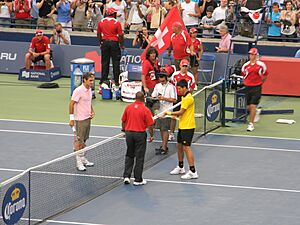
Roger Federer and Novak Djokovic played each other 50 times. Djokovic won 27 matches, and Federer won 23. They were tied on clay courts. Djokovic had a better record on hard courts and grass. They played 17 times at Grand Slam tournaments.
Federer beat Djokovic in their first Grand Slam final at the 2007 US Open. Federer ended Djokovic's 41-match winning streak in 2011 at the French Open semifinals. However, Djokovic got revenge at the 2011 US Open, saving two match points against Federer. They played three Wimbledon finals in 2014, 2015, and 2019. Djokovic won all of them, even saving two match points in the 2019 final, which lasted almost five hours. They also met in the final of the 2015 US Open, where Djokovic won.
Roger Federer vs. Andy Murray
Roger Federer and Andy Murray played each other 25 times. Federer won 14 matches, and Murray won 11. Federer had a better record on hard courts and grass. They never played on clay. Federer won their first professional match. Murray led the early part of their rivalry, but Federer dominated the later part. They met six times at major tournaments, with Federer winning five of those matches. Federer won their first three major finals.
They met in the final of the 2012 Summer Olympics, where Murray beat Federer in straight sets. Murray also had a better record in ATP 1000 tournaments.
Other Notable Rivalries
Roger Federer also had strong rivalries with other players. He played Lleyton Hewitt 27 times, winning 18 matches. He also had good records against David Nalbandian, Marat Safin, Stan Wawrinka, Juan Martín del Potro, Tomáš Berdych, and Jo-Wilfried Tsonga.
Roger Federer's Legacy
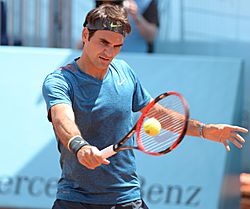
Roger Federer has won the third most Grand Slam tournament titles (20) in men's singles. He is behind Rafael Nadal (22) and Novak Djokovic (24). He reached 31 major finals, which is the second most after Djokovic. This includes a record ten major finals in a row. He won a men's doubles gold medal and a men's singles silver medal at the Olympics. He won a record eight Wimbledon titles, including five in a row. He also won five US Open titles, including five in a row. He held the world No. 1 spot in the ATP rankings for the second-longest time for a male player (310 weeks).
Federer was ranked among the top eight players in the world for 14 years and two weeks straight. He won the ATP Player of the Year award five times. He was also named the ITF World Champion five times. His fellow players voted for him to receive the Sportsmanship Award a record 13 times. Tennis fans voted him the ATP Fans' Favorite for 19 years in a row. These awards show how much he was respected and liked. He also won the Arthur Ashe Humanitarian of the Year Award twice. He won the Laureus World Sportsman of the Year award five times. He also won the BBC Overseas Sports Personality of the Year four times.
Many people consider Roger Federer to be the greatest tennis player of all time. In 2005, Rod Laver called him an "unbelievable talent." When Federer won the French Open in 2009, former world No. 1s Björn Borg and Pete Sampras called him "the greatest player that played the game." Federer himself has said it is hard to compare players from different eras.
In 2018, Tennis.com listed him as the greatest male player of the Open Era. In May 2020, the Tennis Channel also ranked him as the greatest male tennis player of all time. In July 2021, Serena Williams called Federer a "genius" and the "greatest."
Roger Federer helped bring a new "Golden Age" to tennis. This led to more interest in the sport and higher earnings for tennis venues. For example, when Federer first won the Australian Open in 2004, he earned $985,000. When he won in 2018, the prize was AUD 4 million.
Player Profile
Playing Style and Skills
Roger Federer was known for his amazing versatility on the court. Jimmy Connors once said, "In an era of specialists, you're either a clay court specialist, a grass court specialist, or a hard court specialist... or you're Roger Federer."
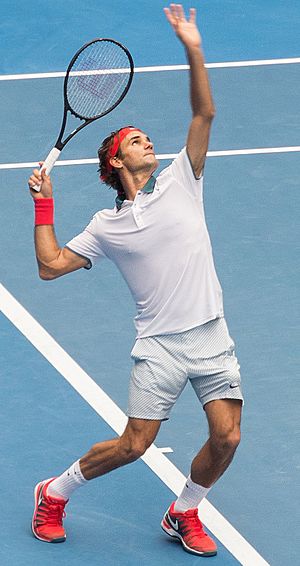
Federer was an all-court player, meaning he could play well from anywhere on the court. He was known for his speed, smooth style, and incredible shots. He mostly played from the back of the court but was also very good at the net. He had a powerful and accurate smash shot. He could also perform difficult shots like the backhand smash, half-volley, and jump smash. He had an aggressive serve return called SABR (Sneak Attack By Roger). John McEnroe called Federer's forehand "the greatest shot in our sport."
Federer used a single-handed backhand, which allowed him to hit many different types of shots. He often used a slice to make his opponent come to the net, then hit a passing shot. He could also hit powerful topspin winners. His serve was hard to predict because he used a similar ball toss for all his serves. He often hit big serves at important moments. His first serve was usually around 200 km/h (125 mph). He was also good at serve and volleying, where he would serve and then immediately run to the net.
Later in his career, Federer added the drop shot to his game. He could hit a well-hidden drop shot with both his forehand and backhand. He sometimes used a shot between his legs, called a "tweener" or "hotdog." His most famous tweener was at the 2009 US Open semifinals. After Stefan Edberg joined his coaching team in 2014, Federer played more aggressively, coming to the net more often. He also started using the SABR technique, where he would rush forward to return a second serve very early.
Demeanor and Attitude=
Federer was known for his calm and controlled behavior on the court. He rarely showed anger or frustration, which gave him an advantage over opponents who lost their temper. He once said that he now laughs when an opponent throws their racket.
When he was younger, Federer lacked self-control and would sometimes throw his racket. However, he learned to control his emotions as he became a professional. His former coach, Adolf Kacovsky, said that even when he lost, Roger never gave up and wanted to learn from his mistakes. The death of his coach, Peter Carter, in 2002 had a big impact on him. He called it a "wake-up call" and dedicated his first Wimbledon title to Carter.
In 2007, Rod Laver described Federer as "one of the most admirable champions on the planet."
Coaches and Influences
Roger's playing style was shaped by his coaches. His first coach, Adolf Kacovsky, taught him quickly. From ages 10 to 14, Roger spent a lot of time with Peter Carter, who helped perfect his technique and taught him strategy. Federer has said Carter taught him his "entire technique and coolness."
His other coaches included Peter Lundgren (1999–2003), Tony Roche (2005–2007), José Higueras (2008), Paul Annacone (2010–2013), Stefan Edberg (2014–2015), and Ivan Ljubičić (2016–2022). Severin Lüthi was his head coach from 2007 until his retirement.
Equipment Choices
In 2014, Roger changed his tennis racket for the first time in his career. He switched to a larger racket head size of 97 square inches. This was bigger than his old 90-square-inch racket. Most other top players, including Nadal and Djokovic, used larger rackets. After that, Federer played with his special Wilson Pro Staff RF97 Autograph racket. He used Wilson Natural Gut strings for his main strings and Luxilon ALU Power Rough for his cross strings.
Off the Court Life
Popularity and Nicknames
Roger Federer was given many nicknames, like "Federer Express" (or "FedEx") and "Swiss Maestro." Some people called him "King Roger" or "The Swiss Perfection." At the 2007 US Open, the American press called him "Darth Federer" because he wore all black. They even played music from Star Wars when he came onto the court.
Time magazine named Federer one of the 100 most influential people in the world in 2007 and 2010. In 2009, he was on the cover of Sports Illustrated magazine, a rare honor for a tennis player. In 2016, he was named the most recognizable person from Switzerland, even more famous than Albert Einstein.
Federer appeared in many memorable TV commercials for companies like Sunrise, Barilla, and Mercedes-Benz. In 2017, he was named the Most Marketable Sports Person. In 2018, he teamed up with DJ Money Mark to release a song made from tennis sounds. In December 2019, GQ readers voted him the Most Stylish Man of the Decade. In May 2020, Federer became the first tennis player to top Forbes's list of highest-paid athletes in the world.
A documentary film called Federer: Twelve Final Days was released in June 2024. It follows the last 12 days of his career.
Honors and Tributes
Roger Federer has received many honors. In 2012, the city of Halle, Germany, named a street "Roger-Federer-Allee." In 2016, the street where he trained as a junior in Biel, Switzerland, was renamed "1 Allée Roger Federer." In October 2021, his hometown of Basel launched a new tram called "The Federer Express," decorated with pictures from his career.
In 2017, the University of Basel gave him an honorary doctorate degree. This was to recognize his role in making Basel and Switzerland more famous, and for his charity work. In December 2019, Federer became the first living person to be featured on Swiss coins. His face was put on the 20-franc coin, and later a 50-franc gold coin.
Charity Work
In 2003, Roger started the Roger Federer Foundation. This foundation helps disadvantaged children get access to education and sports. Since 2004, he has supported the IMBEWU charity in South Africa, which helps children connect to sports and health awareness. In 2006, he was named a Goodwill Ambassador by UNICEF.
Federer has organized many charity events to raise money for people in need. In 2005, he helped organize "Rally for Relief" to help victims of the 2004 Indian Ocean tsunami. In 2010, he helped organize 'Hit for Haiti' to raise money for Haiti earthquake victims. He also played in "Match for Africa" events with Rafael Nadal and Stan Wawrinka, raising millions for his foundation. In 2018, he even played doubles with Microsoft billionaire Bill Gates in a "Match for Africa" event.
Sponsorships and Endorsements
Roger Federer has many sponsors. These include Japanese clothing company Uniqlo and Swiss companies like Credit Suisse, On, Rolex, Lindt, and Sunrise. He also has deals with Mercedes-Benz, Gillette, Wilson, Barilla, and Moët & Chandon. In 2019, he became a shareholder in On, a Swiss athletic shoe company.
Involvement in Football
Roger grew up supporting his hometown football team, FC Basel, and the Swiss national team. In May 2022, he made a surprise visit to the Swiss national football team to meet the players and unveil their new jersey.
Personal Life
Family and Home
Roger Federer is married to former tennis player Miroslava "Mirka" Federer. They met at the 2000 Sydney Olympics. Mirka retired from tennis in 2002 due to a foot injury. They got married on April 11, 2009. In 2009, they had identical twin girls. In 2014, they had another set of twins, this time fraternal twin boys.
Roger owns an apartment in Dubai, where the hot weather helps him train for playing in extreme heat. He also owns two properties in Switzerland: a modern ski chalet and a penthouse apartment in Zürich.
Military Service and Health
Like all male Swiss citizens, Roger was supposed to do compulsory military service when he turned 18 in 1999. However, he was excused due to a chronic back problem. Instead, he served in the civil protection force and paid a percentage of his income.
Throughout his career, Roger rarely withdrew from matches due to injury. In March 2008, he was diagnosed with mononucleosis, which affected his fitness. He had three knee surgeries, two on his left knee in 2016 and 2020, and one on his right knee in 2022. These injuries eventually led to his retirement.
Languages and Religion
Roger was raised as a Roman Catholic. He met Pope Benedict XVI in 2006. His native language is Swiss German, but he also speaks Standard German, French, and English fluently. He can also speak some Italian and a few phrases of Swedish. He often gives press conferences in German, French, and English.
Career Statistics
Grand Slam Tournament Performance Timeline
| W | F | SF | QF | #R | RR | Q# | A | NH |
| Tournament | 1999 | 2000 | 2001 | 2002 | 2003 | 2004 | 2005 | 2006 | 2007 | 2008 | 2009 | 2010 | 2011 | 2012 | 2013 | 2014 | 2015 | 2016 | 2017 | 2018 | 2019 | 2020 | 2021 | SR | W–L | Win % |
|---|---|---|---|---|---|---|---|---|---|---|---|---|---|---|---|---|---|---|---|---|---|---|---|---|---|---|
| Australian Open | Q1 | 3R | 3R | 4R | 4R | W | SF | W | W | SF | F | W | SF | SF | SF | SF | 3R | SF | W | W | 4R | SF | A | 6 / 21 | 102–15 | 87% |
| French Open | 1R | 4R | QF | 1R | 1R | 3R | SF | F | F | F | W | QF | F | SF | QF | 4R | QF | A | A | A | SF | A | 4R | 1 / 19 | 73–17 | 81% |
| Wimbledon | 1R | 1R | QF | 1R | W | W | W | W | W | F | W | QF | QF | W | 2R | F | F | SF | W | QF | F | NH | QF | 8 / 22 | 105–14 | 88% |
| US Open | Q2 | 3R | 4R | 4R | 4R | W | W | W | W | W | F | SF | SF | QF | 4R | SF | F | A | QF | 4R | QF | A | A | 5 / 19 | 89–14 | 86% |
| Win–loss | 0–2 | 7–4 | 13–4 | 6–4 | 13–3 | 22–1 | 24–2 | 27–1 | 26–1 | 24–3 | 26–2 | 20–3 | 20–4 | 19–3 | 13–4 | 19–4 | 18–4 | 10–2 | 18–1 | 14–2 | 18–4 | 5–1 | 7–1 | 20 / 81 | 369–60 | 86% |
Roger Federer career statistics
Year–End Championships Performance Timeline
| Tournament | 1999 | 2000 | 2001 | 2002 | 2003 | 2004 | 2005 | 2006 | 2007 | 2008 | 2009 | 2010 | 2011 | 2012 | 2013 | 2014 | 2015 | 2016 | 2017 | 2018 | 2019 | 2020 | 2021 | SR | W–L | Win % |
|---|---|---|---|---|---|---|---|---|---|---|---|---|---|---|---|---|---|---|---|---|---|---|---|---|---|---|
| ATP Finals | DNQ | DNQ | DNQ | SF | W | W | F | W | W | RR | SF | W | W | F | SF | F | F | DNQ | SF | SF | SF | A | DNQ | 6 / 17 | 59–17 | 78% |
Roger Federer career statistics
Olympic Gold Medal Matches
| Result | Year | Tournament | Surface | Opponent | Score |
|---|---|---|---|---|---|
| Loss | 2012 | Summer Olympics | Grass | 2–6, 1–6, 4–6 |
Other Achievements
- Channel Slam: This means winning both the French Open and Wimbledon in the same year. Federer achieved this in 2009.
- Career Grand Slam: This means winning all four major tournaments (Australian Open, French Open, Wimbledon, US Open) at least once in a career. Federer completed his Career Grand Slam when he won the French Open singles title in 2009.
Records
All-Time Tournament Records
| Tournament | Since | Record accomplished | Players matched | Refs |
|---|---|---|---|---|
| Grand Slam | 1877 | 2 consecutive seasons with 3 singles titles (2006–07) | Stands alone | |
| 4 consecutive seasons with 2+ singles titles (2004–07) | ||||
| 5 consecutive titles in 2 different tournaments (2003–2007 Wimbledon, 2004–2008 US Open) | ||||
| All 4 Grand Slam finals reached in three seasons (2006–2007, 2009) | Novak Djokovic | |||
| 10 consecutive singles finals | Stands alone | |||
| 23 consecutive semifinals | ||||
| 36 consecutive quarterfinals | ||||
| 102+ match wins at two different tournaments (Wimbledon, Australian Open) | Stands alone | |||
| 40 consecutive match wins at 2 different tournaments (Wimbledon, US Open) | ||||
| 8+ titles on two different surfaces (hard & grass) | ||||
| 12+ finals on two different surfaces (hard & grass) | ||||
| 191 hard court match wins overall | ||||
| 5+ titles at 3 different tournaments (Australian Open, Wimbledon, US Open) | ||||
| 4+ consecutive finals at 3 different tournaments (French Open, Wimbledon, US Open) | ||||
| 6+ consecutive finals at 2 different tournaments (Wimbledon, US Open) | ||||
| 7+ consecutive finals at a single tournament (Wimbledon) | ||||
| 13+ semifinals at 2 different tournaments (Australian Open, Wimbledon) | ||||
| 81 singles tournament appearances overall | Feliciano López | |||
| 15 semifinals at a single tournament (Australian Open) | Rafael Nadal | |||
| 18 quarterfinals at a single tournament (Wimbledon) | Novak Djokovic |
Guinness World Records
As of 2019, Federer holds 30 Guinness World Records in tennis, including 18 based on his performance.
Open Era Records
- These records were achieved in the Open Era of tennis (since 1968).
- Records in bold mean he is the only player to have achieved them.
| Time span | Selected Grand Slam tournament records | Players matched | Refs |
|---|---|---|---|
| 2003 Wimbledon – 2009 French Open |
Career Grand Slam | Rod Laver Andre Agassi Rafael Nadal Novak Djokovic |
|
| 2009 French Open–Wimbledon | Accomplished a "Channel Slam": Winning both tournaments in the same year |
Rod Laver Björn Borg Rafael Nadal Novak Djokovic Carlos Alcaraz |
|
| 2003 Wimbledon – 2006 Australian Open |
First 7 finals won | Stands alone | |
| 2006 French Open — 2009 US Open |
Runner-up finishes at all four majors | Ivan Lendl Andy Murray |
|
| 2003 Wimbledon – 2017 Wimbledon |
8 grass court titles | Stands alone | |
| 2008 US Open – 2009 Wimbledon |
Simultaneous holder of majors on clay, grass and hard court | Rafael Nadal Novak Djokovic |
|
| 2004 Australian Open – 2018 Australian Open |
6 existing major champions defeated in finals | Björn Borg | |
| 2006–2007 & 2009 | All 4 major finals in 1 season | Rod Laver Novak Djokovic |
|
| 2000 Australian Open – 2021 Wimbledon |
102+ match wins at 2 majors | Stands alone | |
| 2006 | 27 match wins in 1 season | Novak Djokovic | |
| 2017 Australian Open | 4 match victories vs. top 10 opponents in one tournament | Guillermo Vilas Björn Borg Mats Wilander< Rafael Nadal |
|
| 1999 French Open – 2021 Wimbledon |
81 major tournament appearances | Feliciano López |
| Grand Slam tournaments | Time span | Records at each Grand Slam tournament | Players matched | Refs |
|---|---|---|---|---|
| Australian Open | 2007 | Won title without losing a set | Ken Rosewall | |
| 2004–2014 | 11 consecutive semifinals | Stands alone | ||
| 2004–2020 | 15 semifinals overall | |||
| 2000–2020 | 102 match wins overall | |||
| 2006–2008 | 30 consecutive sets won | |||
| Wimbledon | 2003–2017 | 8 titles overall | Stands alone | |
| 2003–2007 | 5 consecutive titles | Björn Borg | ||
| 2017 | Won title without losing a set | |||
| 2001–2021 | 105 match wins overall | Stands alone | ||
| 2003–2019 | 12 finals overall | |||
| 2003–2009 | 7 consecutive finals | |||
| 2001–2021 | 18 quarterfinals overall | |||
| 2005–2006, 2017–2018 | 34 consecutive sets won | |||
| 2019 | Longest final (by duration) vs. Novak Djokovic | Novak Djokovic | ||
| US Open | 2004–2008 | 5 titles overall | Jimmy Connors Pete Sampras |
|
| 2004–2008 | 5 consecutive titles | Stands alone | ||
| 2004–2009 | 40 consecutive match wins |
| Time span | Other selected records | Players matched |
|---|---|---|
| Year-end championship records | ||
| 2003–2015 | 10 finals overall | Stands alone |
| 2002–2019 | 16 semifinals overall | |
| 2002–2019 | 59 match wins overall | |
| 2002–2015 | 14 consecutive appearances | |
| 2002–2015, 2017–2019 | 17 appearances overall | |
| ATP Masters records | ||
| 2002–2011 | 9 different finals | Novak Djokovic Rafael Nadal |
| 2004–2017 | 5 Indian Wells Masters titles | Novak Djokovic |
| 2002–2007 | 4 Hamburg Masters titles | Stands alone |
| 2005–2015 | 7 Cincinnati Masters titles | |
| 2012, 2015 | Won title twice without having serve broken or losing a set (Cincinnati Masters) |
|
| Ranking records The ATP ranking was frozen from 23 March to 23 August 2020 |
||
| 2 February 2004 – 17 August 2008 |
237 consecutive weeks at No. 1 | Stands alone |
| 4 November 2012 – 19 February 2018 |
5 years, 106 days between stints at No. 1 | |
| 2 February 2004 – 18 June 2018 |
14 years, 136 days between first and last stints at No. 1 | |
| 17 November 2003 – 4 July 2010 |
346 consecutive weeks in Top 2 | |
| 3 March 2003 – 16 November 2020 |
804 weeks ranked in Top 4 | |
| 27 January 2003 – 1 March 2021 |
859 weeks ranked in Top 5 | |
| 20 May 2002 – 11 October 2021 |
968 weeks ranked in Top 10 | |
| 6 March 2000 – 18 April 2022 |
1125 weeks ranked in Top 50 | |
| 12 June 2000 – 18 April 2022 |
1118 consecutive weeks in Top 50 | |
| 20 September 1999 – 18 April 2022 |
1155 weeks ranked in Top 100 | |
| 11 October 1999 – 18 April 2022 |
1153 consecutive weeks in Top 100 | |
| 2003–2019 | 15 times ranked year-end Top 3 | Novak Djokovic |
| 2003–2020 | 16 times ranked year-end Top 5 | Rafael Nadal Novak Djokovic |
| 2002–2020 | 18 times ranked year-end Top 10 | Rafael Nadal |
| Other records | ||
| 2003–2005 | 24 consecutive match victories vs. top 10 opponents | Stands alone |
| 1999–2021 | 783 hard court match victories | |
| 2000–2021 | 192 grass court match victories | |
| 2005–2006 | 56 consecutive hard court match victories | |
| 2003–2008 | 10 consecutive grass court titles | |
| 65 consecutive grass court match victories | ||
| 2003–2005 | 24 consecutive tournament finals won | |
| 2003–2019 | 19 grass court titles | |
| 2002–2019 | 71 hard court titles | Novak Djokovic |
| 2001–2019 | 10+ titles on grass, clay and hard courts | Stands alone |
| 2000–2019 | 15 finals at a single tournament (Swiss Indoors) | |
| 2006–2015 | 10 consecutive finals at a single tournament (Swiss Indoors) | |
| 1998–2021 | 65.4% (469–248) of career tiebreaks won | |
| 1999–2021 | 86.9% (192–29) grass court match winning percentage | |
| 2005–2007 | 3 consecutive calendar years as wire-to-wire No. 1 | |
| 2002–2019 | 24 ATP Tour 500 Series titles | |
| 2001–2019 | 31 ATP Tour 500 Series finals | |
| 2004–2006 | 3 consecutive years winning 10+ titles | Rod Laver |
| 2000–2019 | 20 consecutive years reaching 1+ final | Novak Djokovic |
| Davis Cup records | ||
| 1999–2015 | 40 Davis Cup singles wins for Switzerland | Stands alone |
| 52 Davis Cup singles and doubles wins for Switzerland | ||
| 15 years playing a Davis Cup tie for Switzerland | Heinz Günthardt | |
| Hopman Cup records | ||
| 2000–2019 | 3 titles overall | Stands alone |
| 2 consecutive titles | James Blake | |
| Laver Cup records | ||
| 2017–2022 | Best performance in a tournament (2017 win–loss: matches 3–0, points 7–0) | Stands alone |
| Best performance in singles overall (win–loss: matches 6–0, points 15–0) | ||
See also
 In Spanish: Roger Federer para niños
In Spanish: Roger Federer para niños
- Roger Federer career statistics
- List of career achievements by Roger Federer
- List of Grand Slam men's singles champions
- Tennis Masters Series records and statistics
- List of ATP number 1 ranked singles tennis players (since 1973)
- World number 1 ranked male tennis players (all time, based on recognized tennis authorities)
- All-time tennis records – Men's singles
- Open Era tennis records – Men's singles (since 1968)
- ATP Tour records (since 1990)
- ATP Awards
- 2004 Summer Olympics national flag bearers
- 2008 Summer Olympics national flag bearers
 | Toni Morrison |
 | Barack Obama |
 | Martin Luther King Jr. |
 | Ralph Bunche |


